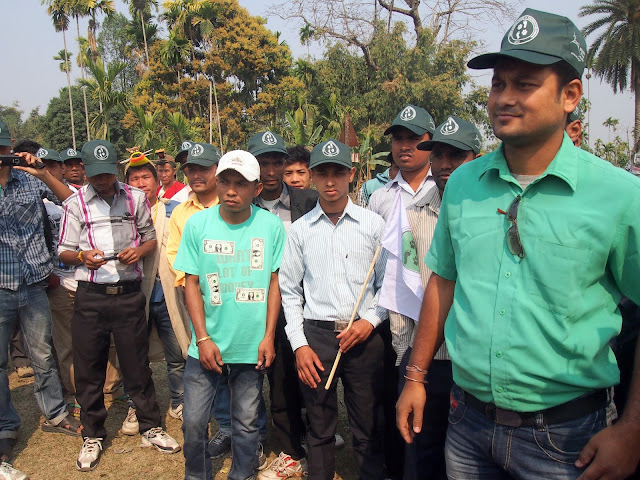One country 02 states, Assam and Arunachal Pradesh. One river
02 names, Kameng and Jia Bhareli. One continuous habitat 02 Tiger Reserves,
Pakke and Nameri. One language spoken by 16 different communities. This is the
language of ‘conservation’ spoken by 16 different communities living around
Pakke and Nameri Tiger Reserves at the recently completed ‘Pakke-Nameri
Conservation and Peace Carnival’, from Pakke Jungle Camp at Seijosa in East
Kameng District of Arunachal Pradesh to Ban Theatre in Tezpur in Assam.
Imagine who took the initiative, the Nyishi community Gaon
Burras. The Nyishis and conservation, the ones who wear Hornbill beak
headgears, everyone laughed at us as if we were joking. Community conservation
at Pakke Tiger Reserve, initiated by the DFO, Tana Tapi, ADCF, now Field
Director, along with some National Wildlife NGOs by getting together the Nyishi
Gao Burhas (Village Heads) into an organization called Ghora Abhe Society, who
in turn organized locally led conservation by their community to save this
extraordinary Tiger Habitat. Help Tourism was invited here to boost the process
and they added community based ecotourism infrastructure to the initiative,
‘the Pakke Jungle Camp’.
The dynamics were perfect, but in isolation. The work of
Ghora Abhe Society was being appreciated nationally and internationally, but
there was hardly any news or awareness or initiative locally in the
neighbourhood. The 02 partners in ecotourism, Ghora Abhe and Help Tourism sat
with the Field Director of Pakke Tiger Reserve and discussed that it will be
impossible to sustain conservation if the similar dynamics is not set in
continuing Nameri Tiger Reserve. The several community leaders of different
communities around Nameri Tiger Reserve were invited for a preliminary meeting
to Pakke and convinced to participate in community based conservation. To do
the first awareness program, a carnival for peace and conservation was planned.
The once isolated community, Nyishis, fierce hunting
community referred to as ‘Dafla’ by the neighbours in Assam, now took the
responsibility to lead habitat conservation and wildlife protection in the
region, infact they took the ownership on conservation. This is not strange,
conservation was always in their gene, only that we cannot interpret this with
our modern sense of conservation. They always lived as a part of nature, ate
out nature, built shelter out of nature, got their clothing out of nature and
lived the most sustainable lifestyle in isolation. We wanted to make them
global, they appeared before the world in their hornbill headgears and we
shouted that they were killing hornbills to make headgears. We often consider
Hornbills to Tigers, as the king representative in their respective categories,
birds and mammals. The Nyishis wear this as their headgear to show the world
that they belong to an extremely diverse habitat, which they have lived with
for time unknown and where hornbills are abundant. We have, through our greed
destroyed these entire habitats and act as pro-conservation people from our
un-natural homes and offices. The English could not make them a part of their
industrial revolution and termed them TRIBALS.
The time for us has come to be TRIBALS, to be a part of the
natural system beyond borders, and not trying to exploit nature, each for our
own selfish interest. If we have created some infrastructure, let us all blend
it with the biodiversity forces locally and convert ourselves to the religion
of BIODIVINITY. Come and train with the TRIBALS in their traditions.
The support for the rally was provided in a big way at Tezpur
by Nature’s Beckon, an Assam based NGO, pioneers in the field of community
based conservation and presently extends hands to some Northeast states and
West Bengal.



















No comments:
Post a Comment